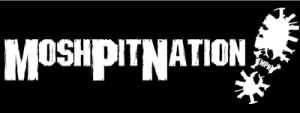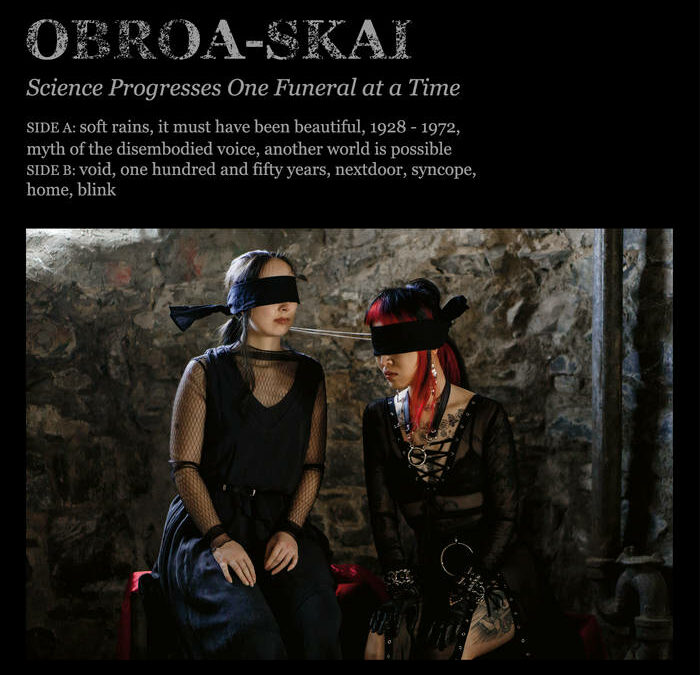Band – Obroa-Skai
Album – Science Progresses One Funeral at a Time
Country of Origin – Canada
Genre – Screamo/Noise/Post-hardcore
Release Date – November 17, 2023
Label – Zegema Beach Records
Author – Andrew Dana
Obroa-Skai’s first available recording is a terrific self-titled EP from 2019, which contains premonitions of the sound they’ve grown into – a particularly mournful type of screamo, as hard-hitting as it is tragic, but with harsh noise and ambient music as equally prominent stylistic elements. This unique multi-genre span is clearly more than just atmospherics to the band, and the structure of that debut EP makes this clear, featuring significant elements of improvisation and noise in the project’s centerpiece and longest track, “Wytai”.
“Soft Rains”, which is the first track on their latest album, Science Progresses One Funeral at a Time, demonstrates how central experimental and electronic music is to their approach. The vibe begins calm, even soothing, with cascading carpets of white noise evoking a cinematic image of a rain-washed street. As the song progresses, the production evolves. An electronic ticking sound inserts an industrial feeling, and bassist/vocalist Amy Lewis enters, speaking, with a cryptic poem about rain on a burned-down building. When this spoken word performance thickens into a desperate roar, the noise, though barely changing by itself, seems to expand from a pleasant drizzle to a roiling sea.
The narrative of “Soft Rains” is so impressive because the fundamental texture – filtered white noise – remains constant, and few layers are added. But within the progression of Lewis’ masterful vocal performance and the unsettling lyrics, the fragility of the track’s initial peaceful nature becomes apparent. Not much needs to happen to make a seemingly safe environment threatening, which can serve not just as a musical technique but as a metaphor – for the numerous ways that in a society with extreme wealth inequality, a broken car, health emergency, or burned down house has the power to ruin a person’s life.
This first track is far more than just an ambient intro to a screamo album – it’s a musical composition that serves an integral part of the album’s structure; a bold introduction to its mood, and to its lyrical themes. This record is deeply, truly miserable, a cathartic cry against earthly demise and the wasted potential of countless lives crushed by capitalism and colonialism.
It is a testament to the soundscape of “Soft Rains” that it returns later in the album to end the first half, painting another image even more dire than the beginning. “Void” takes the same sounds that were vividly evocative on the first track – noise used cinematically, as rain tapping a window – and recontextualizes them to become an abstract horror. Featuring the band’s other vocalist Cory Lewis delivering a much more existential lyric, the crashing white noise now feels like the end of everything. Using the ambiguity of these simple sonic materials, Obroa-Skai maintains an impressive emotional range, evoking an existential, cosmic sorrow. Bookending the first side of this record with these two sonically similar noise pieces instills a pessimistic narrative arc. What begins with a direct, literal tale of an infrastructural failure in “Soft Rains” ends up in “Void” as an evocation of pure, uncut dread, and using the same sounds connects a description of an event to a raw, gut-wrenching emotion.
Between these two abstract, disturbing noise pieces comes a tight, kinetic sequence of politically-charged vignettes over dissonant post-hardcore riffs that recall both the math-rock adjacent noodling of Hot Cross and the distorted wall-of-sound chords of recent screamo superstars Ostraca. Stuttering rhythms undergird powerfully blunt lyrics about status-quo liberalism in the face of Canada’s colonial genocide, the whitewashing of a eugenicist historical figure, the displacement and depersonalization resulting from gentrification, and other deeply sincere anti-capitalist sentiments.
Screamo and its forerunner emocore have a long history of left-leaning political lyrics, but Obroa-Skai brings a special directness to their own. Legendary bands like Orchid, Combatwoundedveteran, and Ampere have brought a cerebral abstractness to political thought, a theory-heavy and revolutionary perspective that, while furious, maintains some emotional distance from the devastation and loss that late capitalist society causes. Obroa Skai follows more in the tradition of bands like Circle Takes The Square, fusing their own deeply personal emotional wreckage to their critiques of systemic greed with a poetic, tragic writing style.
This record has an infectious momentum, one track melting into the next at an energetic pace – but “Another World Is Possible” brings the listener to a sudden halt as the musical texture completely disintegrates. In the final guitar-driven song in the first half, the chords suddenly slam into each other, becoming a slow series of harsh, stabbing clusters of sound, dripping with feedback each time they let up. Overlapping layered vocals only add to the disorienting and overwhelming quality of the track. This moment feels like a rope pulled so tight it has begun to snap.
This song’s use of a socialist slogan as its title is less uplifting than it is desperate – by contrasting the title with some of the album’s most scathing lyrics (using Adam Smith’s metaphor of the market’s “invisible hand” against capitalism, invoking an image of death by strangulation), “Another World Is Possible” begins to mean that another world must be possible, because the alternative is the gradual degradation of everything.
This is another apex in a record full of brilliant moments – the inescapable, suffocating use of feedback reminding me specifically of some of my favorite moments from Dead In The Dirt’s excellent The Blind Hole or Jeromes Dream’s searing comeback The Grey In Between from the past year. But “Another World Is Possible” is also unique – nothing else on this record sounds like this, making it all the more intense.
I spent so much time writing about this first half of the record because there are so many details to highlight just how perfectly paced and evocative it is. But every single track offers a unique spin on Obroa-Skai’s style. The last five tracks have a different narrative arc, no less fluid and enticing – mostly comprising devastating songs, each with distinct emotional characteristics, each with a more riffy, hardcore bent – more closely resembling the best of 90s metalcore and emoviolence with juddering syncopated rhythms, occasional blast beats, and riffs that alternate between melodic and violent.
In the middle of these final songs comes “Syncope”, another unique highlight. This is an electronic piece without vocals. Calm, ambient clean guitars serve as the album’s only reprieve, a cool remedy for the scalding terror that has unfolded track after track.
Of all the sorrow shared over the state of the world in this album, the final track “Blink” is perhaps the most dire. Opening with a blast beat accompanying a terrifying explosion, it crashes into the album’s rawest riffs yet, and the track thrashes forth as a crusty, d-beat-inflected rager featuring impassioned wails from both vocalists. This is some of the heaviest and most direct material on the album, but in true emoviolence fashion, it doesn’t stay in its groove for more than 30 seconds, quickly burning through a few intense phases before shifting gears to the emotional climax of the entire album.
Over sustained chords, now soaring, the final stanza of the lyrics begins, which almost reads as a thesis statement for the entire record:
Blink / Flags of war flying freely against a blood red sky / Blink / Tanks plowing forward, ever on towards eternity’s gate / Blink / Goose stepping soldiers, marching in step with nationalistic pride / Blink / A knife carving out fascist cancer before it has time to spread.
The importance of these lines is highlighted by their repetition, which occurs as the riff slumps, then gradually winds down to a crawl. Along with the first half’s climax, this is some of the only slow material on the album – a chord progression that was screamo at one speed seamlessly transitions into a doom metal outro, drearily repeating for a minute, as the final line – “before it has time to spread” – repeats, over and over. Then, at a seemingly random point in the riff, the song ends before it can resolve.
These last lyrics served for me as an image of the world as it now exists, and how in the blink of an eye, conditions can change. This slow, desperate dirge ends abruptly because those lyrics placed me in the present. The fascist creep is here, and the abrupt ending in the music forms an unanswered question.
Science Progresses One Funeral At A Time is a terrific piece of work, haunting, cathartic, beautiful, and devastating. The musical decisions consistently caused me to stop and marvel at their unique and exciting extension of the screamo genre, and at every turn serve to amplify the meaning of the lyrics. For a first LP, this is incredibly impressive and I am very excited to see what else could be in store for this band in the future.
Biography: Andrew Dana is a composer, bassist, and recovering academic. His own musical output draws from free improvisation, electroacoustic composition, metal, and jazz.

